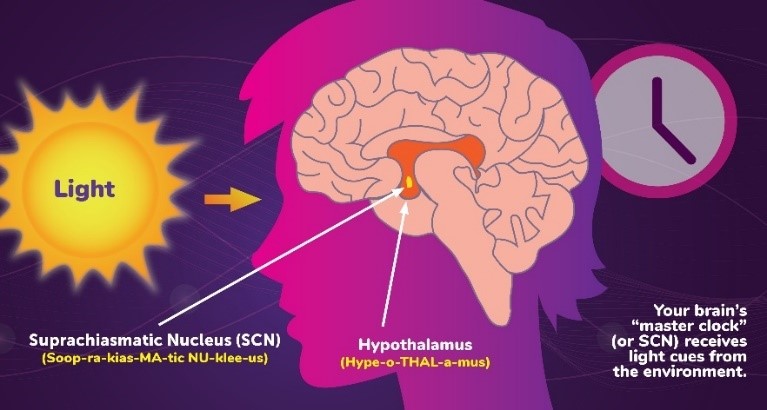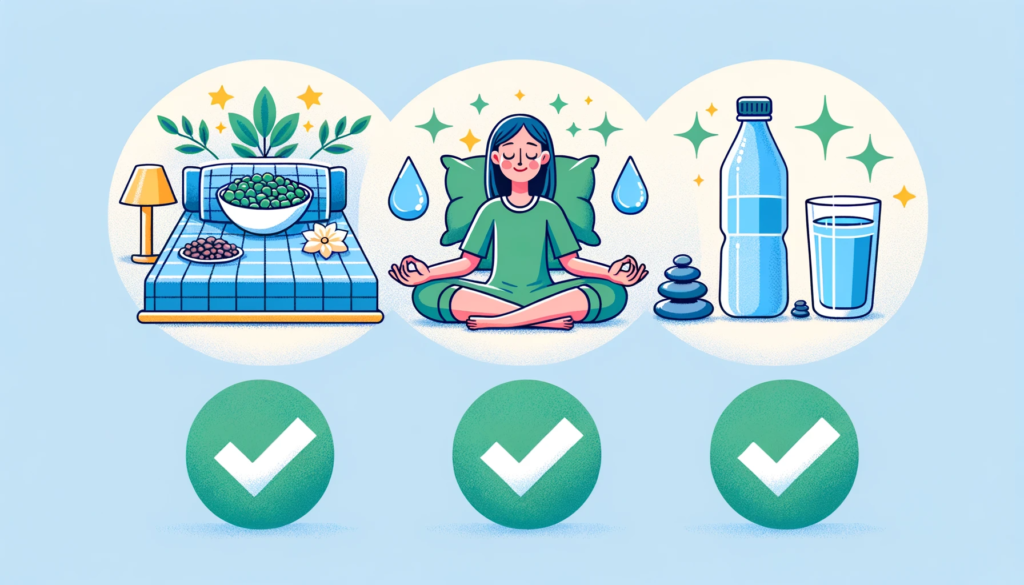Engaging in a perpetual struggle with sleep, or simply yearning for more restful nights? Don’t fret, you’ve landed in the precise spot! (However, it’s probably not the best idea to turn off your alarm just yet, particularly if you’re just starting out on your journey towards learning oyr scientific sleeping guide your sleep pattern.)
Thanks to our superstar, Science, we’ve got some seriously cool facts that’ll help you kiss those restless nights goodbye and welcome the bliss of deep, quality SLEEP!
1. Unlocking the Secrets of Circadian Rhythms
Understanding your internal clock, or circadian rhythm, could be the key to a complete sleep makeover. It’s more than just being a morning person or a night owl; it’s about knowing when your body is naturally wired to sleep and wake.

The circadian rhythm, a 24-hour internal clock running in the background of your brain, cycles between sleepiness and alertness at regular intervals. This rhythm dictates our sleep patterns and is influenced by external factors like light and darkness.
Diving deeper into this fascinating schedule set by nature, we find that the circacdian rhythm can be tweaked and bent to work in our favor. So, how do we do this?
- Maintaining a consistent sleep schedule. This means going to bed and waking up at the same time every day, even on weekends. This can help to regulate your body’s clock and could help you fall asleep and stay asleep through the night.
- Exposing yourself to natural light during the day and keeping nights dark. Our bodies are designed to follow the rhythm of the sun. Natural light exposure in the daytime helps us stay awake and upbeat, while darkness at night tells our bodies it’s time to sleep.
- Being mindful of your diet. What you eat can affect your sleep. For example, caffeine and alcohol can interfere with your sleep patterns.
Let’s get a little more data to back these suggestions up. Please pay close attention to the following table:
Unlocking Circadian Rhythm: Your Cheat Sheet
| Activities | Timing |
|---|---|
| Morning sunlight exposure | Within 2 hours of waking |
| Last meal of the day | At least 3 hours before bedtime |
| No more caffeine | 6 hours before bedtime |
| Darkening the environment | 1 hour before bedtime |
2. Master The Subtle Art of ‘Power Napping’

You might have heard of the term ‘power nap,’ but do you fully understand its value? Power napping can be a strong ally to improve sleep quality, especially for individuals going through high-stress environments. A quick, 20-minute nap can profoundly enhance cognitive abilities like learning, memory, and creativity while at the same time lowering stress levels.
Remember, it’s called a ‘power nap’ for a reason. Be sure to keep it short and sweet! Sleeping longer than 30 minutes during a nap can lead to sleep inertia—a groggy, disoriented feeling post-nap.
Moreover, it is vital to take your nap during the mid-afternoon period, not later, to avoid interfering with your main nighttime sleep.
3. Understand the Essential Factors of Restful Sleep: Balanced Diet, Adequate Water Intake, and Relaxation

Nutrition and hydration affect our bodies on many levels, including sleep. Eating healthy meals with enough complex carbohydrates, and rich in vitamins, minerals, and amino acids can help boost the quality of your sleep. Drinking plenty of water keeps our body hydrated, reducing the chances of a restless night due to thirst.
- Complex carbohydrates such as whole grains and vegetables release sugar slowly into your bloodstream, stabilizing your energy level, helping you fall asleep faster.
- Food rich in tryptophan, an amino acid that aids in the production of serotonin (a mood stabilizer) and melatonin (a hormone that regulates sleep), can contribute to a good night’s sleep. Turkey, eggs, and cheese are some tryptophan-rich foods.
- Hydration is key. Dehydration is often a leading cause of wakefulness in light sleepers. It’s essential to maintain a balanced water intake before bed, ensuring hydration without the need for midnight bathroom trips.
Adapting these eating and drinking habits can create a meaningful difference in the way you sleep. However, remember that sudden changes in diet can also lead to temporary sleep disturbances. Therefore, it’s always best to introduce these changes gradually and monitor your body’s response.
While it’s commonly suggested to consume foods high in tryptophan, like turkey, to enhance sleep quality, this may actually be a myth. Contrarily, turkey might not significantly contribute to promoting better sleep. For a more detailed insight, visit Scientific American’s article on the subject.
4. Mastering the Secret Art of Breathing Techniques
Perhaps this insight may seem new to some, but I urge you to test it out. Have you ever noted how deep, soothing breaths can induce a sense of tranquility? It’s not a mere perception! There’s real science backing up this concept that you can leverage for improved slumber.
According to CNN Health, controlled breathing is a practice known as “4-7-8 breathing,” where you inhale for 4 seconds, hold your breath for 7 seconds, and exhale for 8 seconds. This slow and deliberate breathing pattern can help reduce anxiety and promote sleep
CNN
Controlled Breathing: The Secret Ancient Art from The Slumberland
This is a method of breathing where you consciously control your breath, usually by slowing it down, and paying attention to each inhale and exhale. It is a technique borrowed from yoga, and it has a number of scientifically proven benefits, including promoting calmness and reducing stress, both of which can help improve sleep.
Here’s how you can practice it:
- Sit or lie down comfortably with your back straight and relax your shoulders.
- Breathe in slowly and deeply through your nose, to the count of four. Feel your stomach expand as you fill it with air.
- Hold your breath for a count of seven.
- Exhale fully through your mouth to a count of eight, getting all the air out.
- Repeat the process three more times for a total of four breath cycles.
This process, known as the 4-7-8 technique, can help calm your mind and body, preparing you for sleep.
The Box Breathing Method: This is another calming breathing technique that’s useful for reducing stress and helping you to unwind before bedtime.
To give it a try, follow these steps:
- Find a comfortable position, sit up straight, and close your eyes.
- Inhale slowly to the count of four, filling your lungs with air.
- Hold your breath for a count of four.
- Exhale slowly to the count of four, fully releasing the air from your lungs.
- Hold your breath again for a count of four.
- Repeat the cycle several times.
Both of these techniques can be done as part of your pre-bedtime routine, or even in bed as you’re trying to fall asleep. By incorporating these two techniques into your daily routine, you’ll be well on your way to a better night’s sleep.
Conslusion
In wrapping up, we’ve discovered key techniques to significantly improve your sleep, from understanding your circadian rhythms to mastering the art of ‘power napping’. The importance of a balanced diet, sufficient hydration, relaxation and controlled breathing can’t be overstated in achieving restful sleep. By incorporating these insights into your daily regimen, you’re taking meaningful steps towards enhancing the quality of your sleep, and thereby, your overall well-being.
It’s our hope that these science-backed tips bring about tangible and positive changes to your sleep patterns, aiding you in facing each new day refreshed, revived, and energized. In the pursuit of health and wellness, may your nights be just as fulfilling as your days. Goodbye, dear readers, and here’s to dream-filled nights and vibrant mornings!

